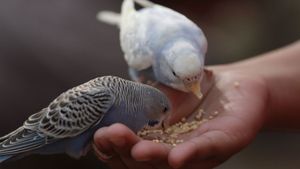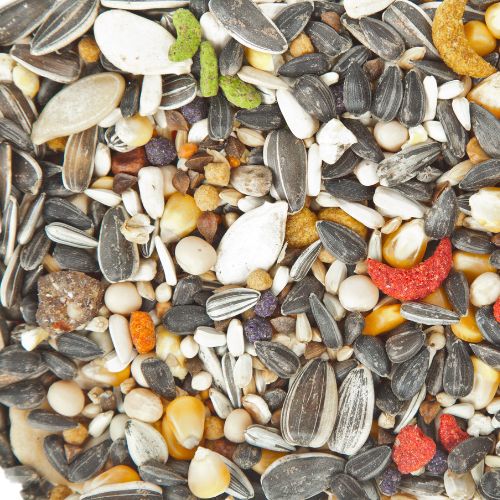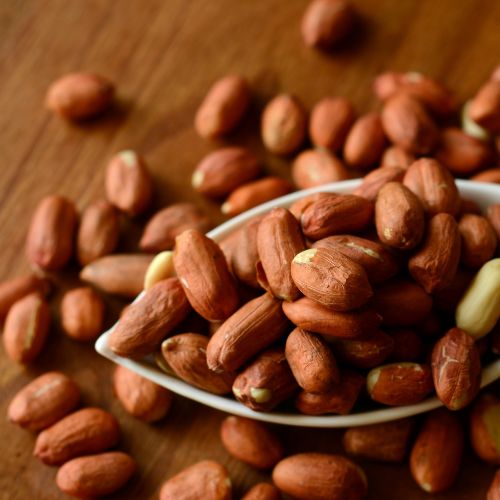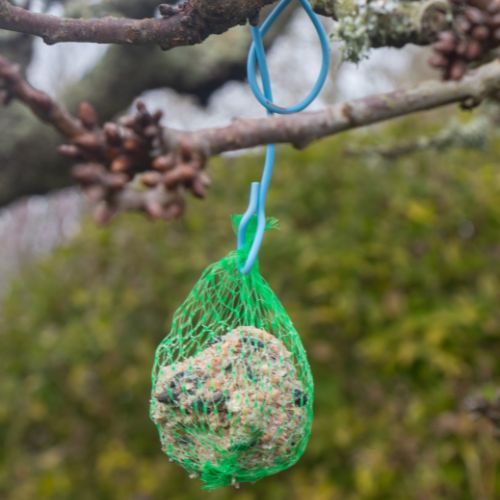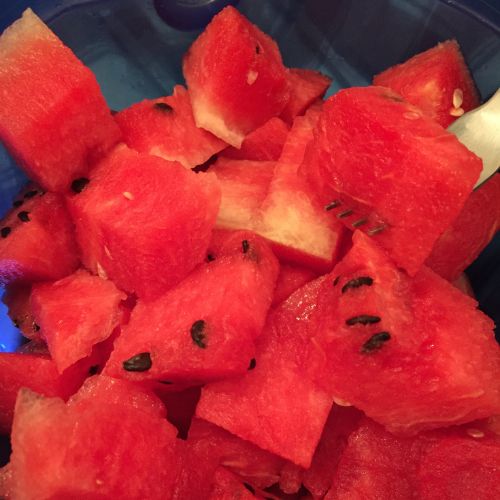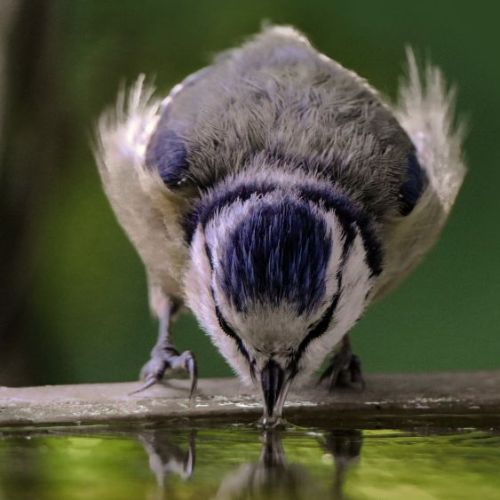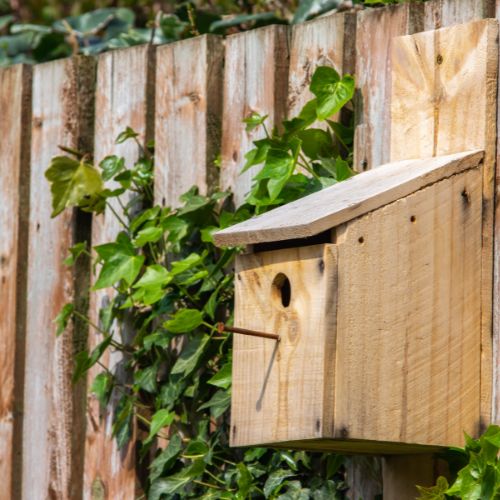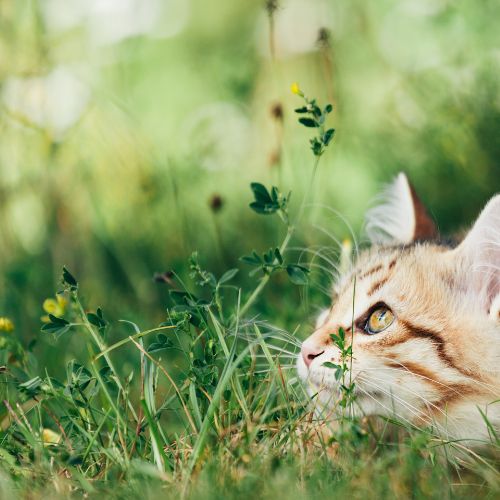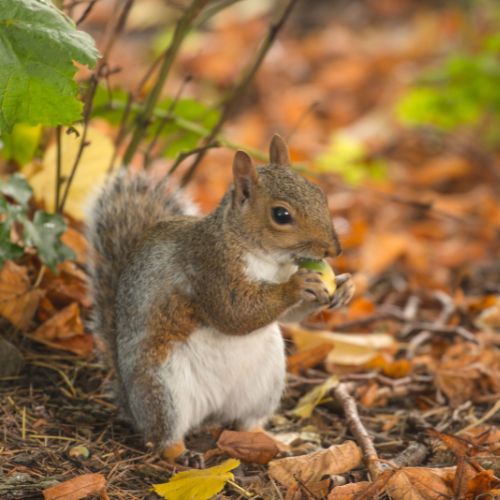5 Simple Tips for Feeding Birds in Winter
We always look forward to feeding birds in winter. You get a real sense of satisfaction looking out of your window and seeing birds flocking for a bite to eat. Plus, it doesn’t take much effort at all!
With their natural food source being hidden by soggy mud or snow, it becomes more of a challenge for birds to find food in the winter months. So, offering a food source in your garden will really help them. But you'll want to make sure you're providing the right foods and in the right way, and make sure your garden is bird-friendly.
Our gardening experts have put together this helpful guide to help you keep your garden visitors happy and healthy all winter.
Here's a brief overview of our top tips for feeding wild birds in winter:
1. Keep all bird feeders clean
2. Offer a variety of foods for different birds
3. Keep water available at all times
4. Provide shelter
5. Deter predators and pests
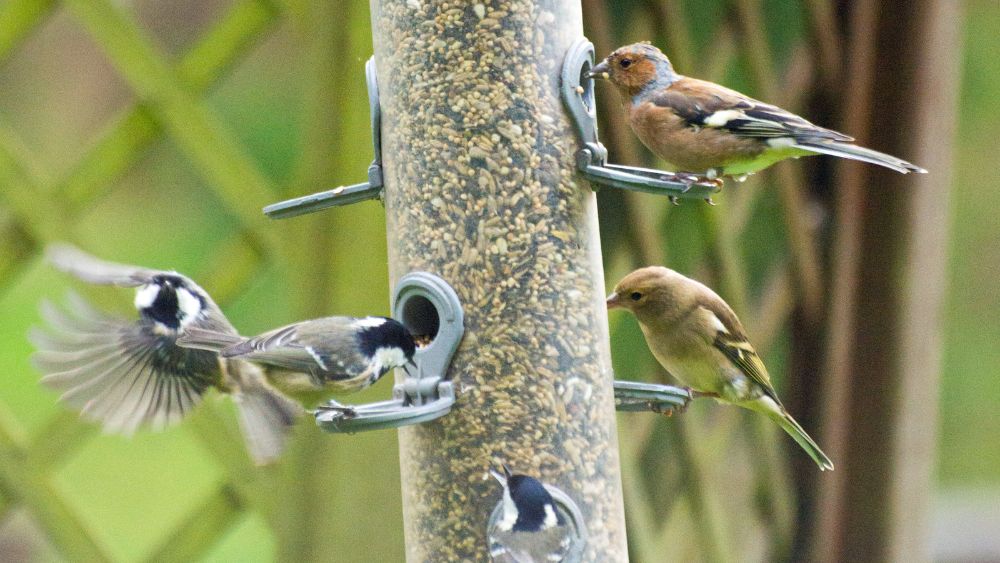
1) Keep Your Bird Feeders Clean
When you’re feeding birds in winter, you must keep your feeders clean. Dirty feeders can harbour disease, which can be devastating for bird populations.
To clean your feeders, simply:
-
Soak them in a solution of one part bleach to ten parts water.
-
Rinse them thoroughly with clean water
-
Allow them to dry completely
-
Refill them with bird food.
If a lot of birds visit your garden, make sure you also offer enough feeders. This will help to prevent fighting over food, which can sometimes result in injury or even death.
And how many birdfeeders do you need? Birdseed & Binoculars suggest, “There isn’t one right answer. And really, it is largely up to you. You could choose a single feeder or a dozen. My advice is to start with one feeder and see how it goes.”
It's also a good idea to provide some feeding options on the ground to cater to ground-feeding species and less agile birds. It also provides an additional food source to further prevent squabbles over access to food.
2) Offer a Variety of Foods for Birds in Winter
As the weather turns colder, you'll want to provide garden birds with foods high in energy. This is because they will burn a lot of energy simply to keep warm.
Whilst you want to ensure your feathered friends are well-fed, you should also try to offer a variety of foods to ensure they get all the nutrients they need.
What to Feed Birds in Winter
You can purchase most types of bird food from garden centres or pet stores. You can also use items in your kitchen to provide nutritional, affordable food for your garden visitors.
Some of the best household foods for birds include:
-
Sunflower seeds
-
Peanuts
-
Chopped fruit
-
Peanut butter
Sunflower Seeds
One of the best foods to offer birds in winter is sunflower seeds. These little seeds are packed full of energy and nutrients, making them the perfect food to help birds through the cold months.
You can buy sunflower seeds and seed mixes from most garden centres or pet stores, and they're pretty inexpensive. Striped sunflower seeds are especially good for birds since they are easier for them to eat.
Peanuts
Peanuts are high in fat, which is ideal for helping birds to stay warm. You can buy dry roasted peanuts and offer them whole, or get hold of special bird peanuts that have been crushed and are easier for birds to eat.
If you do opt for whole peanuts, put them in a feeder that has small holes. This will stop larger birds from taking all of the peanuts and leaving smaller birds without anything to eat.
Fat balls
Fat balls are another great food to offer birds in winter. These are made from a mixture of fat and seed, which makes them high in energy. You can buy fat balls from most garden centres or pet stores.
They provide an important food source for various birds, and they’re easy to hang in your garden within bird feeders. Fat balls contain a lot of fat (hence the name), so only offer them sparingly.
Chopped fruit
It's important to remember that not all birds eat seeds. Some, like blackbirds and thrushes, prefer to eat fruit. You can offer chopped fruit such as apples, pears or bananas to these birds.
If you do offer fruit in the winter months, make sure it’s fresh and free from mould. Mouldy fruit can be harmful to birds. Place the fruit on a bird table or in a ground feeder.
You can also make your own bird food by chopping up fruit and mixing it with a little fat. This will provide a more nutritious food source for birds, and it’s easy to make at home.
Peanut butter
Birds love peanut butter, and it’s a great way to help them through the winter months. Peanut butter is high in fat, which will help birds to stay warm.
You can offer peanut butter to birds by spreading it on slices of bread or fruit. You can also buy special bird feeders that have a compartment for peanut butter.
Make sure you only give birds a small amount of peanut butter, as too much can be harmful. Also, avoid using sweetened or salted peanut butter, which isn’t good for birds.
3) Keep Fresh Water Available in a Bird Bath or Dish
While feeding birds in winter is vital to keep birds healthy, it’s also important to keep water available for them to drink and bathe in.
In the cold months, water can freeze over, making it difficult for birds to access. So, to help them out, you can put a bird bath or dish filled with fresh water in your garden. Place this in a sheltered spot so that the water doesn't freeze over. You can also buy special bird baths with a built-in heater to keep the water from freezing.
Water baths tend to attract birds such as robins, thrushes and blackbirds. You can even offer some extra food, such as chopped fruit or peanuts, to birds that use the bath. A bird table is also a great place to put water as well as food.
4) Provide Plenty of Shelter in Your Garden for the Birds
Another way to help birds in winter is to provide them with shelter. This can be in the form of a birdhouse or nest box. You can buy these from most garden centres or pet stores, or you can even make your own.
Putting a birdhouse in your garden will give birds somewhere to roost and shelter from the cold weather. Make sure you put the house in a sheltered spot, out of the wind and rain.
You can also provide birds with shelter by planting dense hedges or evergreen trees in your garden. These will give birds somewhere to hide from the cold weather and predators.
5) Deter Predators and Pests From Your Garden
Predators not only pose a threat to the lives of the birds in your garden, but they also deter them from coming in the first place.
Cats
The most common predators in UK gardens are domestic cats. In fact, they're responsible for the extinction of over 33 endemic species throughout the world, and the birds in your garden are at risk if you don't deter these animals.
There are many ways you can deter domestic cats from entering your garden, but one of the most effective methods is garden netting. Our Plastic Cat Safety Fencing is popular with at-home gardeners and is easy to install around the perimeters of your garden. It’ll help to prevent these felines from prowling through your garden without making your garden look unsightly.
Bigger Birds
Other predators in UK gardens include squirrels, foxes, magpies and crows. These animals often feed off the eggs of smaller birds like goldfinches or robins ,so it’s important to discourage them.
You can do this by stocking bird feeders high enough that these animals can't reach them, or by fitting your garden with bird spikes.
Squirrels
Pests, such as squirrels, can also have an effect on the wild birds that come to your bird table. Without the proper deterrents, squirrels will eat the food you put out to feed birds, leaving them with very little to eat.
You can purchase squirrel deterrents from most garden centres and even pet shops to prevent access to your bird feeder and bird table. Appropriate netting and mesh can also make it harder for these pests to enter your garden.
How to Protect Your Plants from Birds in the Winter
As a result of the food shortages for birds in the winter, you might find that more birds will try and eat your garden crops or the berries off of your plants. This can be a problem as it can damage the plant or stop it from fruiting the following year.
One way to protect your plants from birds is to cover them with bird netting. This will create a barrier that birds cannot get through, but it won't harm them. You'll want to ensure you don't use a netting that’ll cause the birds to get tangled, as this can be dangerous.
Bird netting with a mesh size of 20mm is ideal, as it’ll protect your plants from birds without posing the risk of harm. And installing bird netting is relatively easy, so you can do it yourself. We would recommend keeping it up even past the winter and through to spring, as this is when many birds start to nest.
You can also scare birds away from your plants by hanging up shiny objects or CDs around the area. The reflection from these will scare the birds away but won't harm them.
Summary: Protecting & Feeding Birds in Winter Months
Many birds die each year from cold weather, so it’s important to do what you can to help them through the winter months. By providing food, water and shelter, you can make a big difference to the birds in your garden.
If you're worried about birds eating your plants, you can protect them by covering them with bird netting. This way, you’ll protect your plants without causing any harm to our feathered friends.
For more garden tips, tricks and recommendations, head over to our blog!
FAQs
In the UK, you can begin feeding birds as the weather begins to get colder, typically around October or November. During this time, when natural food sources may become scarce, providing nourishment for our feathered friends can greatly assist them in their survival and overall well-being. During the winter months, when birds face the challenges of cold weather, it is crucial to provide them with a high-energy food source to aid their survival. One of the best options is to offer nutrient-rich fat balls, which are packed with essential fats and oils. Additionally, peanuts and sunflower seeds are excellent choices as they provide birds with a good amount of energy to keep them warm and nourished. When it comes to feeding birds, it's important to be aware of certain items that can be harmful to them. For instance, it's best to avoid offering bread, as it lacks the necessary nutrients and can cause digestive issues. Similarly, chocolate is toxic to birds and should never be given to them. By being mindful of these potential hazards, we can ensure the well-being of our feathered friends. One effective method is to provide alternative food sources, such as bird feeders stocked with seeds and suet, so the birds are less likely to turn to your plants for sustenance. Additionally, you can protect particularly vulnerable plants by covering them with bird netting, ensuring they remain inaccessible to birds without causing any harm to the birds. When feeding birds in your garden, always ensure the food is fresh and mould-free. Mouldy or spoiled food can cause serious harm to birds. Clean your bird feeders regularly to prevent disease spread, and always provide fresh water for them to drink and bathe in. If you find an injured or sick bird in your garden during winter, the best thing to do is to contact a local wildlife rescue centre. They can help the bird and get it the care it needs. Do not try to care for the bird yourself, as you could do more harm than good. Wildlife rescue centres have the knowledge and experience to care for injured and sick birds, so they will be in the best hands.When should I start feeding birds in the winter?
What is the Best Type of Bird Food to Offer in the Winter?
What Should I Not Feed Birds?
How Can I Stop Birds from Eating My Garden Plants in Winter?
What Precautions Should I Take When Feeding Birds in My Garden?
What Should I Do if I Find an Injured Bird in My Garden in Winter?

